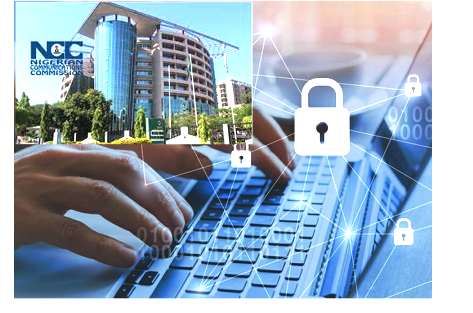By Zoka Chiamaka Oruame
Cyber fraud is on the rise as the internet becomes more ubiquitous and as the pandemic forces many activities online. One report by the Financial Times showed that the coronavirus pandemic has triggered epidemic of cyber fraud. “Individuals and corporations face ever more sophisticated online deceptions” – and there is increased need for vigilance.
Nigeria is one of the world’s most vulnerable countries to cyber attacks. In 2018 alone, about 60% of Nigerian firms suffered from cyber attacks and about $270 million was spent on cyber security. This is why the Nigerian Communications Commission (NCC) is increasingly focusing on raising awareness among other strategies to get everyone involved and checkmate cyber fraud.
To quote another authority, an “August 2020 survey of fraud examiners worldwide revealed increases in different types of fraud risks after the start of the coronavirus pandemic. In May 2020, 45 percent of respondents reported a significant increase in cyber fraud risk. Additionally, 60 percent of respondents expected a significant increase in cyber fraud risk over the next twelve months.”
“In 2018 alone, about 60% of Nigerian firms suffered from cyber attacks and about $270 million was spent on cyber security.“
Fraudsters are not shrinking in operations or numbers. In fact, they are exploding as a 2021 index would show. Whether as malware, viruses, Trojans or phishing and many other scrawny terms, cyberfraud is an ever present danger whether in the financial, e-commerce, or any online venture. Cyber fraud share of account takeover incidents increased by 20% points compared to 2019, according to Kaspersky. Using anonymised statistics, the internet security company was able to demonstrate a global surge in cyber crime by well over 55% in only two years.
In Nigeria’s financial institution, over N25 billion cyber frauds have been recorded in the last five years, according to the Chartered Institute of Forensic and Investigative Auditors of Nigeria (CIFIAN). The trend is frightening and corrosive; even more worrisome, it is bound to escalate.
This is where cyber security comes into play and why governments worldwide and several other institutions are applying measures with procedures to defend their systems against malicious activities of fraudsters. Nigeria is not an exemption.
Earlier in February this year, President Muhammadu Buhari launched the National Cybersecurity Policy and Strategy (NCPS) 2021, where he directed a reworking of the country’s engagement of cyber security to lay emphasis on exploring the internet for economic growth opportunities and mitigation of crime.
If governments all round the globe, set up proper infrastructure towards cybersecurity, it would significantly minimize the risks of cyber threats in both public and private organizations.
At the top end, cyber security is the process that involves defending computer systems, servers, mobile devices, electronic systems, networks and data from malicious and unauthorized attacks. At the other end, cybersecurity requires massive awareness and education to get everyone kit up on fending off fraudsters.
Cyber threat is rapidly evolving with an increasing number in breaches of data every year. With the large scale of continuous rise in cyber threat, the International Data Corporation (IDC) predicts that worldwide spending on cyber security solutions will reach a massive $133.7 billion by 2022.
“NCC [recently] alerted telecom subscribers to the rising cases of phishing scams and other e-frauds.“
Cybersecurity is the only way to safeguard computers and private data against viruses, malware and any other unwanted programming. It provides protection against theft of data, deletes malicious elements in pre-existing networks, prevents any sort of unauthorized access and secures sensitive information. Cybersafety provides enhanced cyberspace security, improves cyber resilience, speeds up data, protects confidential data, blocks computer hackers activities and identity theft which seems to be the common trends of today’s world.
How NCC is helping to fight cyber threats
The Nigerian Communications Commission (NCC) has adopted some strategies to ensure a secure cyberspace that is safe for both operators and consumers of communications services and infrastructure in Nigeria. Awareness with education is a key strategy the NCC is using to help Nigerians guard against becoming victims of online fraudsters.
Only recently, the NCC alerted telecom subscribers to the rising cases of phishing scams and other e-frauds.
“Protect your accounts, never let your guard down,” the telecom regulator told subscribers in a statement signed by Director, Public Affairs, Dr. Ikechukwu Adinde.
The NCC regularly organises awareness programmes including the annual National Cyber Security Awareness Month (NCSAM) that heavily focuses on raising awareness on cyber-security and educating consumers on online safety.
Through series of awareness and sensitization campaigns, the NCC aims to empower consumers by making them aware of both the positive and negative sides of the internet and safety procedures to take in whatever situations they find themselves in.
An example of the sensitization campaign organized by the NCC is a visit to secondary schools in Abuja and Lagos earlier this year to educate students on safer internet practices and the dangers of cyber-bullying.
Simple steps against cyber-threats
There are simple steps every consumer should practice that could go a long way in defending themselves against cyber-threats such as using strong passwords to protect their devices, also making sure your device software is frequently updated so as to make it difficult for hackers to access private information, also make sure to store passwords in a safe place.
Although cyber security has some drawbacks to it, the positives completely out-weigh the negatives and it is the only means to fight and be protected against cyber-attacks.
The few challenges to cyber security such as fire walls could sometimes be difficult to configure correctly, and if not, properly configured may prevent users from performing certain functions on the internet and they also need to be constantly updated to the newest software so as to keep the security up to date which may be costly for the average user.
Never-thee-less, education remains critical as the first step to keeping cyber criminals at bay. This is where the NCC has remained active. People and organizations alike need to be constantly updated on new methods and ways to protect themselves from all kinds of cyber attacks.
Without cyber security we are at constant risk of dangerous threats such as viruses, malware or worst case scenarios like coordinated cyber crimes including ransomware, keylogging, hacking of passwords, theft of company information and requesting for money and cyber bullying which may be severely damaging to an individual or an organisation.





























